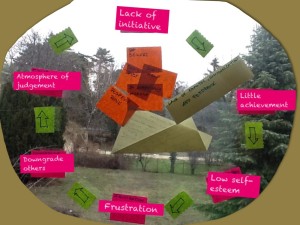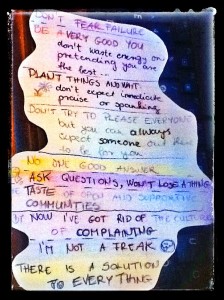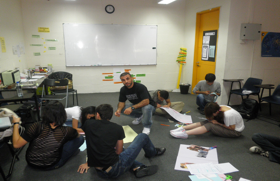ELT Report From Hungary
– Barbi Bujitas
In my country, teachers’ lives are hugely determined by the socio-cultural environment that has an infusion of learned helplessness. Just as it is learned, it can be unlearned, I believe.
There is this little friend of mine, my age minus 19 years, who likes to keep everything shipshape and tidy. The other night when we met, she parked her car in the car park’s second empty slot rather than in the first. I asked why she’d done that and her answer made me feel ashamed. She’s parked in the second spot because she saw a pole in the middle of the walkway in line with the first parking place. She wanted mothers with strollers to be able to pass by easily and didn’t want to narrow the way even further with her car. Why did this make me feel ashamed? I would never ever have thought about mothers with strollers. Why am I not as emphatic as she is? And how about the professionals who created that particular car park-walkway-electricity pole combination? What’s wrong with them?
Our culture, the one being reproduced by schools, is not one in which people can imagine being in someone else’s shoes. It’s not that we are bad people. It’s been passed down by the previous generations. What else? We don’t trust each other. We are suspicious, afraid of backbiting, and not so willing to help. We assume, rather than ask. We overrate rank, and we break rules. Informal relationships are often more crucial than expertise. We are poor collaborators and notorious competitors. Praise and gratitude are scarce. When we face a positive attitude we suspect someone wants to sell us something. We still have the remnants of feudalism and the ruins of an absurd kind of socialism.
How about teachers? Can you imagine how it feels to work in this environment? It’s like running in water. Honestly, there are better ways. There is a peculiar vicious cycle that is still here, very similar to the cycle of failure described here by Chuck Sandy. Our cycle of failure is much bigger:
Lack of initiative For long decades people were trained to keep silent. Even I was taught to conform in order to avoid trouble. Of course there were times you could achieve a lot by fitting in the suppressive system, and though those times are gone, the patterns linger on. Teachers? They have to please students, bosses and parents. They are struck by financial turmoil, tired and overworked. No one seems to be willing to rescue them. In a culture of “no initiatives” it seems hopeless.
Little achievement No sense of achievement produces emptiness that is easily filled by pleasing others. Teachers? I’m a freelancer. I feel good about myself because I can afford to be innovative and some of my innovations work, but in a state school you are hardly welcome as an innovator.
Low self-esteem Achievement will boost your self-esteem, right? No or low self esteem will lead to frustration. Teachers? It’s a challenging job in a hostile environment with low pay. If you are a teacher here, chances are you’ll burn out early.
Frustration and Judgment How do we tackle this? A widespread way here is by downgrading others. If you feel you are a low achieving teacher you blame parents, students, and colleagues. If you feel you’re not good enough, you might say “but teacher X is even worse”. Then, you’ll be on alert to spot the X’s slightest mistake. Worse, you’ll assume others are scrutinizing and judging you in the very same way. Does peer observation work? No! Lesson observation here is a form of insult. You’ll stay away from peer observation and won’t think of implementing any kind of change, thus avoiding the possibility of being caught red handed by suspicious eyes!
Why Am I Here? So here I am living in an atmosphere of depression and a culture of complaining. Questionable values broadcast by manipulative mass media, poured on people deprived of critical thinking skills by long decades of similarly manipulative anti-democratic, soviet-style governments. Teeeerrrrrible! What am I doing here?
I was born here in a family where many of my ascendants we killed, tortured, and robbed of their freedom and belongings. My roots determined my direction, but I’m terribly lucky because of Web 2.0. Magically, it’s taught me some of those life skills that my family and local culture haven’t, and now changing this dark world into something brighter is the funnest challenge for me!
Flipping The World Remember my friend from that newer generation? She is a child of this society, but she keeps in mind all the moms with the baby buggies all the time. She has the Internet. She is connected. She speaks English. She will have enough power to get out of any kind of misery as she upgrades and upgrades and upgrades. That connectedness will flip this world for the better.
Connect with our iTDi Associates, Mentors, and Faculty by joining the iTDi Community. Sign Up For A Free iTDi Account to create your profile and get immediate access to our social forums and trial lessons from our English For Teachers and Teacher Development courses.














